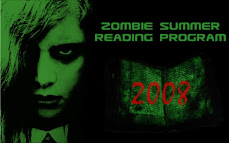 A Time to Be Born by Dawn Powell
A Time to Be Born by Dawn PowellThis would have been a Zombie Summer Reading Program review, save for the fact that Dawn Powell is probably the best-known writer that no one has heard of. Her books come back into print every few years, and she was once name-checked on Gilmore Girls (in the season 2 episode where Jess comes to Starr's Hollow)*. She was also one of Hemingway's favorite writers. Allegedly, he once told her, "You are the best woman writer I know and I don't mean woman writer." Gee, thanks Hem.**
A Time to Be Born is a deliciously nasty and gossipy novel, that nonetheless has some heft to it, being set in New York shortly before Pearl Harbor. Our anti-heroine, Amanda Keeler Evans, has evolved from the daughter of an Ohio beautician to the wife of one of the most powerful newspaper publishers in the United States through brilliant and calculated scheming. After snatching Julian Evans away from his wife and making him her own, she sweet talks him into publishing her ghastly novel (and he makes sure it receives nothing but glowing reviews). Then she fashions herself as a celebrated war and relief organizer, taking in European refugees, then pawning them off on Julian's first wife. Amanda is simply too important and too busy to be expected to entertain a bunch of grubby refugees.
Enjoying the fruits of her ill-got gains, Amanda is hesitant to revive any of her contacts with old school chums. However, when Ethel Carey, a grasping Midwestern socialite, shows up at Amanda's house and entreats her to take another old friend under her wing, Amanda agrees. She has her reasons.
Enter Vicky Haven, a clueless Sister Carrie-meets-Dottie Renfrew. When her fiance runs off with her business partner, Vicky becomes the laughingstock of Lakewood, Ohio until she receives a seemingly out of the blue invitation to come to New York. Under Amanda's watch, Vicky gets a magazine job, a swanky studio, and an escort to some fine dinner parties with her betters. And of course, Amanda has her reasons, charity not being top of the list.
I'm not sure whether it's more fun to watch Vicky Haven muddle through the New York social scene, unintentionally making all the right moves, friends, and power plays, or watching Amanda squirm when her scheming finally catches up with her, but it's a great read.
If you liked...: The Best of Everything by Rona Jaffe or The Group by Mary McCarthy, this book is for you.
___________________
* Although the last couple seasons of Gilmore Girls were awful, I miss watching television that includes semi-obscure literary references on a regular basis. There's a pretty staggering list of books mentioned on the show here, although it only seems to cover the first couple of seasons.
** Needing the money, Dawn Powell once considered selling her correspondence with Hemingway, but decided against it, saying, "I wouldn't dare to. He said such really awful things about other writers."














